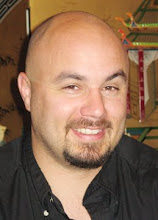
Leif started taking classes at Kansas State University when he was in the spring semester of his senior year at Manhattan High School and continued at KSU after graduating from MHS in May 1993. This is an essay he wrote for his Human Development class in the spring semester of 1994 when he was 19 years old. I think it is revealing of some of his feelings about a couple of the moves he made as a military "brat" and how he molded his personality to fit the environment in which he found himself. It would be interesting to see what he would think today, or at the end of his life. He always remained vitally interested in psychology and personality theory, and he might have majored in psychology instead of general social sciences if he hadn't had to take math, which he hated, like statistics.
Leif Garretson
HDFS 110
February 11,'94
For this assignment I would like to discuss the various aspects of Sigmund Freud's psychoanalytical/psychosocial theories of development. I find that Freud had a unique and brilliant, but simultaneously narrow and simplistic, insight. His description of the human psyche in terms of the id, ego, and superego, rings true and explains a large percentage of one's personality.
However, Freud's intense concentration on the libido as the sole motivator is unrealistically unilateral. According to Berk (1994) Freud states that the ego develops as a mechanism for satisfying the demands of the id within the confines of reality. Later the superego develops as the conscience that further inhibits the desires of the id. I agree with Freud about the structure of the psyche, however, I do not believe that the child's personality has completely formed by age five.
I have had opportunities to change my personality dramatically much later in life. This, I believe, is due to the fact that growing up as an army "brat" I had my environment changed dramatically every few years. In my opinion, the most profound of these changes occurred immediately following my freshman year of high school, at approximately age fifteen. I had been living in an upper-middle class suburb of Chicago, known as Highland Park. Highland Park was a predominantly Jewish city with a very exclusive social structure. The people that had grown up there and already had long-standing relationships formed their own groups that were virtually impenetrable. I found that an outsider like myself could not break into one of these cliques and became as inconspicuous and introverted as possible.
In contrast, after moving to Puerto Rico I found that I could leave my old self behind and become whoever I wanted to be. I responded much differently. In Puerto Rico I was regarded as something exotic and changed my entire behavior dramatically. I began to wear nicer, less ordinary clothes; I became much more confident and assertive. I began to make lasting friendships that I had not made in the past. I began to do all the things that I never would have dared in Highland Park, including developing a "rep" for being a flirt. The person that I became in Puerto Rico, and for the most part remain today, is the antithesis of the invisible army "brat" that I was prior to the move.
In my opinion the Freudian theory of development can be very helpful as a model for therapeutic reference and is a good base for psychoanalysis. However, it gives explanations for only a few aspects of human development. It suffers from an extreme overemphasis on sexual impulses. Freud seeks to explain all of human behavior through sexual impulse, an approach that is inadequate and rather narrow-minded.
The psychosexual stages are an excellent map through the human psyche which tells us how the mind itself learns to deal with the world. They give a working explanation for certain adult behaviors and are extremely useful for psychotherapy. On the other hand, they are ineffective for defining all but a small number of personality traits. The concept that a person's personality is established by the age of five is absurd (Berk, 1994).
Freud's work was and is essential to the development of both the disciplines of psychology and human development. "His psychsexual theory was the first approach to stress the importance of early experience for later development." (Berk, 1994). His theories are important and must be understood to grasp a large potion of developmental thought. However, they should not be taken as the "Gospel."
[Berk, Laura E. (1994) Child Development, (pp. 14-15) Boston: Allyn and Bacon]
-----------------------
At the time he wrote this, he probably still had his long hair, but he was required to cut it to keep his job. He was working at Aladdin's Castle in the Manhattan Town Center Mall. When he got the job, he had long hair and the management had no problem with that, but then it was purchased by a new owner (Japanese I think) that required employees to have short haircuts and he cut his, I don't know just when that change occurred but this picture was taken on the day of his marriage to Nikko, October 20, 1995.





No comments:
Post a Comment